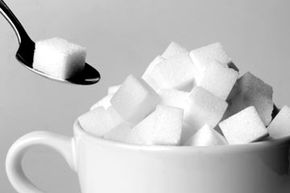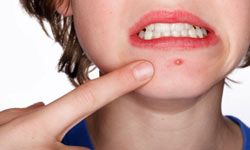You might have heard that eating chocolate or greasy foods can cause acne, but these are both just myths. The truth is that food has little to do with breakouts.
Acne occurs when the openings of hair follicles become blocked with oil secretions, dead skin cells and bacteria. Breakouts typically occur on the face, neck, chest, back and shoulders -- areas of the body with the largest number of sebaceous, or oil, glands. Your oil glands moisturize and protect delicate skin tissue, but when dead skin cells block the glands, oil can build up and cause a bacterial reaction, resulting in the inflammation associated with acne [sources: Mayo Clinic, WebMD].
Advertisement
Although some studies suggest that food may contribute to acne formation, most doctors agree that acne actually results from a combination of factors, including hormonal changes, genetic predisposition and skin friction [source: Mayo Clinic].
Junk food is often blamed for acne breakouts, and one researcher investigated whether hormones in milk caused acne in teenagers. The study found that junk food, including soda, chocolate and potato chips, had no effect on acne -- but it did find a link between acne and milk. However, the results of this study aren't entirely reliable given the conditions under which the study was conducted, and researchers say the link needs to be investigated further [source: American Academy of Dermatology].
Additional studies have looked at whether the common Western diet may contribute to acne. Many people in Western cultures eat large amounts of refined carbohydrates and smaller amounts of fresh fruits and vegetables. The researchers in this study found that in countries where people ate low-glycemic diets -- consisting of fresh fruits, vegetables and lean proteins -- acne presented little or no problem. However, adequate research hasn't been done to examine the link between high-glycemic diets, such as those in the West, and acne breakouts [source: American Academy of Dermatology].
Still, other studies show that eating foods high in vitamin A and beta-carotene can increase your resistance to bacteria and improve the overall health of your skin. Such foods include carrots, sweet potatoes, cantaloupe, apricots, kale and spinach [source: WebMD]. However, more research is needed to determine if eating such foods really promotes clear skin.
For more information on food and acne, see the links on the following page.
Advertisement


